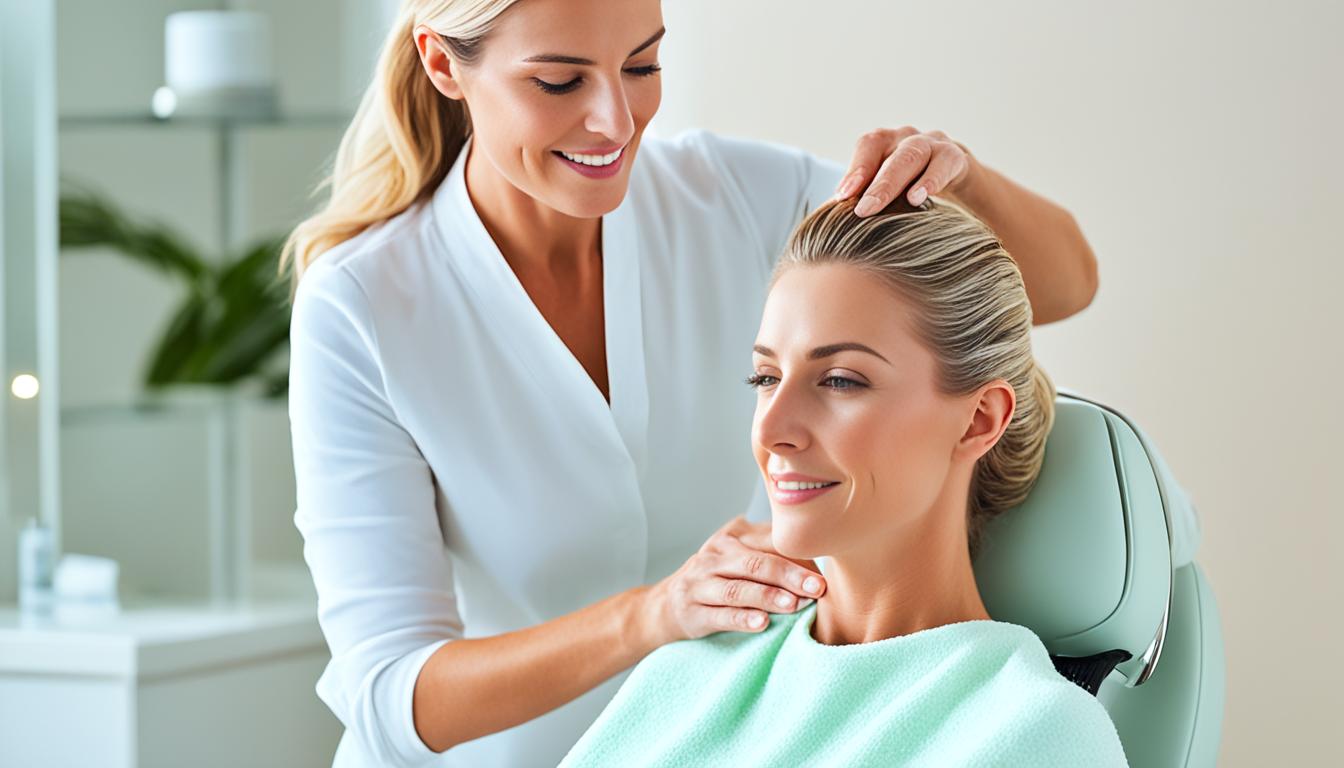Excessive sun exposure can wreak havoc on our skin, including the sensitive skin on our scalp. Sun-induced scalp concerns can range from mild sunburn to more serious conditions like scalp psoriasis. But fear not, there are effective treatments available to address these concerns and restore the health and appearance of your scalp.
When it comes to treating sun-induced scalp concerns, it’s essential to understand the impact of UV radiation on our skin. Prolonged sun exposure can lead to skin damage, increase the risk of skin cancer, and accelerate the aging process. That’s why it’s crucial to take proactive measures to protect our scalp from the harmful effects of the sun.
Key Takeaways:
- UV exposure can cause sun damage, increase the risk of skin cancer, and result in visible signs of aging.
- Effective treatments for sun-induced scalp concerns can improve the appearance and health of the scalp.
- Individuals with light skin tone, a history of skin cancer, many moles, or frequent sun exposure are particularly vulnerable to sun damage.
- Sun-induced scalp concerns can include sunburn, scalp psoriasis, and other dermatological conditions.
- Medicated shampoos, corticosteroids, scale softeners, and light treatments are some treatment options available for sun-induced scalp concerns.
Treatment Options for Sun-Induced Scalp Concerns
When it comes to treating sun-induced scalp concerns, there are several options available. Medicated shampoos containing ingredients such as clobetasol propionate can be effective in reducing inflammation and scaling associated with scalp psoriasis. Clobetasol propionate is a corticosteroid that helps to alleviate symptoms including redness, itching, and flaking.
Other treatments for sunburn on the scalp include:
- Scale softeners: These products, such as salicylic acid, can help soften and remove scales caused by sunburn on the scalp.
- Calcipotriene: A form of vitamin D, calcipotriene can help slow the growth of skin cells and reduce inflammation on the scalp.
- Tazarotene: This topical retinoid can improve the appearance and texture of sun-damaged skin on the scalp.
- Coal tar: Coal tar preparations, available in shampoos and creams, can help relieve inflammation, itching, and scaling caused by sunburn on the scalp.
In more severe cases, dermatologists may recommend more intensive treatments such as injections of corticosteroids or light therapies like the excimer laser. These treatments can provide targeted relief and promote healing for sunburned scalp.
It is important to follow the treatment plan prescribed by a dermatologist and use the medications as directed for optimal results. Consistency and proper application are key to effectively treating sun-induced scalp concerns and healing sunburned scalp.
Expert Tip:
“When treating sunburn on the scalp, avoid further sun exposure and protect the affected area with a wide-brimmed hat or sunscreen. This will prevent additional damage and aid in the healing process.”
The Use of Efudix® for Sun-Induced Scalp Concerns
When it comes to treating sun-damaged scalp, finding the best treatment for a sunburned scalp is crucial. One effective remedy for sunburn on the scalp is the use of Efudix®, a topical treatment that can target and improve sun-induced scalp concerns.
Efudix® works by destroying abnormal skin cells and causing inflammation in the lesions. It is generally applied twice a day for 3-4 weeks or once a day for 4-6 weeks to a small area of affected skin. It is essential to start with a small area of application and gradually increase the treatment area over time to minimize potential intense inflammation.
While Efudix® can be highly effective in treating sun-damaged scalp, it’s crucial to follow a dermatologist’s guidance and not apply it to the entire face or scalp due to the risk of adverse reactions. In some cases, a topical steroid or antibiotic may be prescribed to manage any severe reactions that may occur during the treatment.
With an impressive 85% effectiveness rate, Efudix® can be repeated or used to address individual lesions that may appear in the future. If you’re seeking a sun-damaged scalp treatment, Efudix® may offer a valuable solution to soothe and improve the health and appearance of your scalp.
FAQ
What are some effective treatments for sun-induced scalp concerns?
Some effective treatments for sun-induced scalp concerns include medicated shampoos containing ingredients such as clobetasol propionate, corticosteroids, scale softeners, calcipotriene, tazarotene, coal tar, injections of corticosteroids, and light treatments such as the excimer laser.
How can I treat sunburn on my scalp?
To treat sunburn on the scalp, you can apply cold compresses to relieve pain and inflammation, use aloe vera gel to soothe the sunburned area, take over-the-counter pain relievers like ibuprofen, keep the scalp hydrated with moisturizers, avoid further sun exposure, and wear a hat or use sunscreen when going out in the sun.
What remedies can I use to treat sunburn on my scalp?
Some remedies for treating sunburn on the scalp include applying a cool milk compress, using black tea bags soaked in cold water, using cucumber slices on the affected area, applying plain yogurt or honey, and using natural oils like coconut oil or lavender oil.
How can I heal sunburned scalp?
To help heal a sunburned scalp, it is important to keep the scalp moisturized, drink plenty of water to stay hydrated, avoid further sun exposure, apply a cold compress or take cool baths to relieve pain and inflammation, and use over-the-counter hydrocortisone creams or aloe vera gel to soothe the sunburned area.
What is the best treatment for sunburned scalp?
The best treatment for a sunburned scalp may vary depending on the severity of the sunburn. Options include using over-the-counter hydrocortisone creams, aloe vera gel, or natural remedies like cucumber slices or cool milk compresses. It is important to avoid further sun exposure and keep the scalp moisturized for optimal healing.
Are there any specific treatments for sun-damaged scalp?
Yes, there are specific treatments for sun-damaged scalp, including medicated shampoos, corticosteroids, scale softeners, calcipotriene, tazarotene, coal tar, injection of corticosteroids, light treatments such as the excimer laser, and the use of topical treatments like Efudix®. A dermatologist can assess the condition of your scalp and recommend the most suitable treatment option for you.
How does Efudix® work for sun-induced scalp concerns?
Efudix® is a topical treatment that can be used for sun-induced scalp concerns. It works by destroying abnormal skin cells and causing inflammation in the lesions. It is applied twice daily for 3-4 weeks or once daily for 4-6 weeks to a small area of affected skin. The treatment area can be gradually increased over time. Efudix® is 85% effective and can be repeated or used for individual lesions that may appear in the future.
Can Efudix® be used for the entire face or scalp?
No, Efudix® should not be applied to the entire face or scalp as it can cause intense inflammation. It is important to start with a small area of application and gradually increase the treatment area over time. In some cases, a topical steroid/antibiotic may be prescribed to manage any severe reactions. It is best to consult with a dermatologist to determine the appropriate application and usage of Efudix®.


1 thought on “Effective Treatments for Sun-Induced Scalp Concerns”